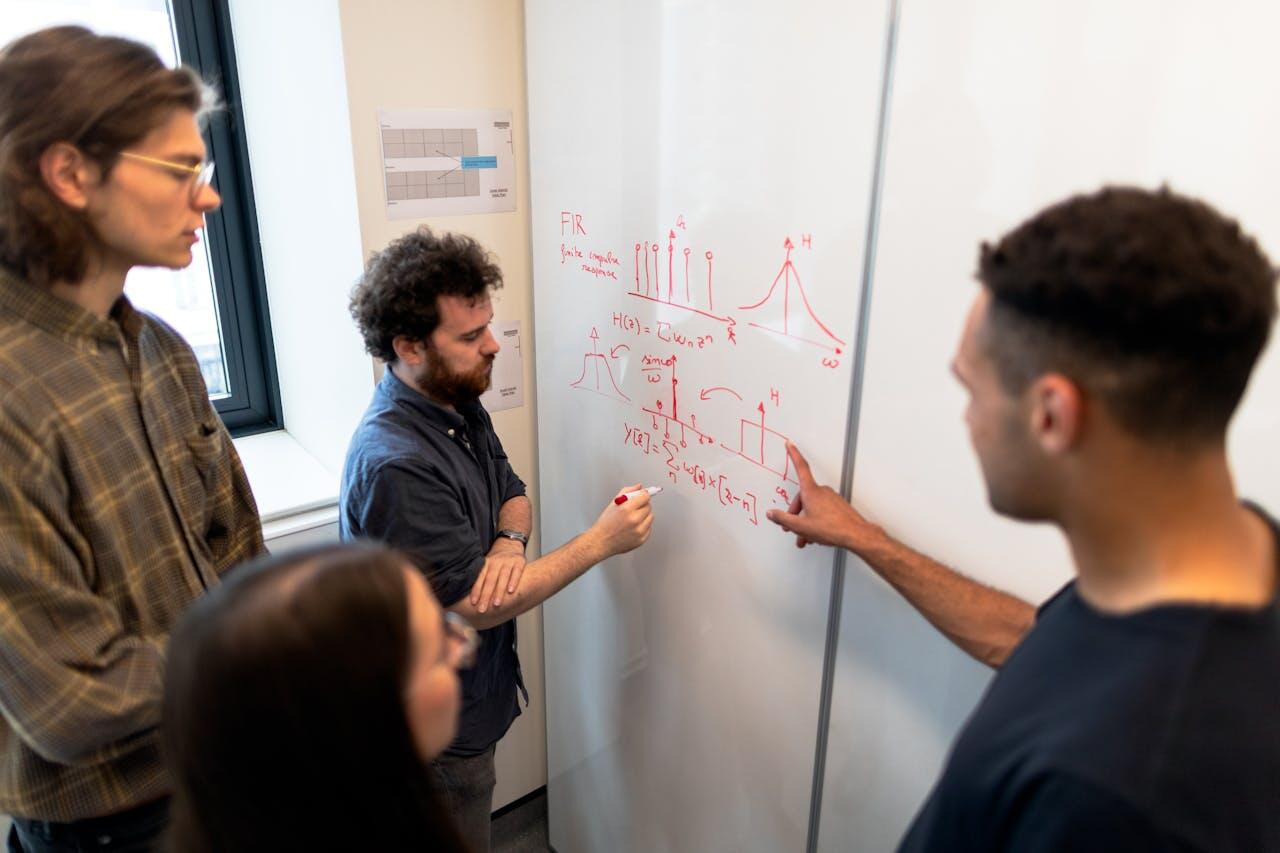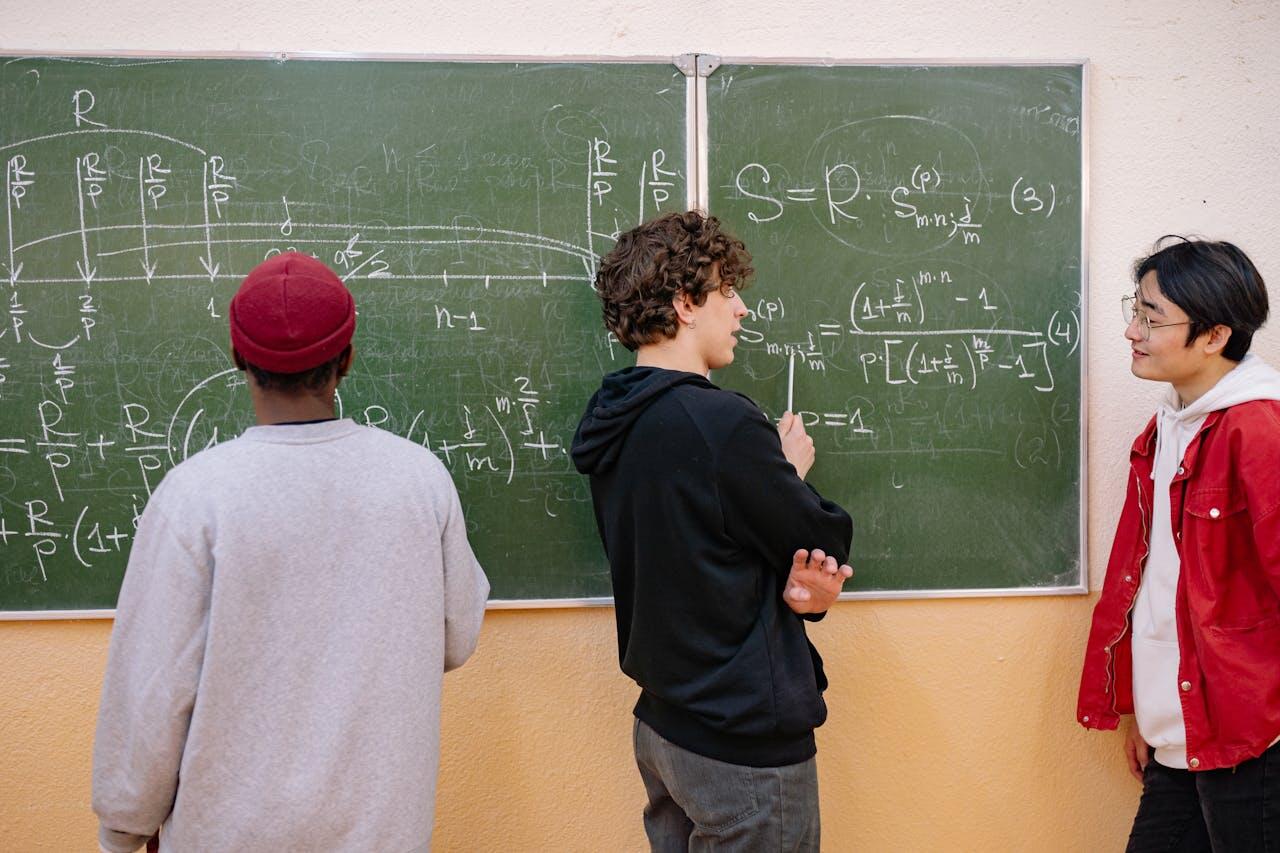Many learners don't like maths or the idea of numbers; it's got a negative reputation as being difficult to understand, and students and adults alike are apprehensive about attempting to solve maths problems, particularly in trickier domains like calculus and trigonometry.
Given that it is a compulsory subject at primary school and secondary school in the UK, there are a series of core GCSE Maths topics to be mastered, especially for those who are about to graduate from high school soon. In this article, we will be taking a look at these key points to ace your GCSE Maths papers with ease.
Key Takeaways
- Overview of GCSE Maths Syllabus
- Latest Exam Format for GCSE Maths
- Inclusion of Formula Sheets in 2025
- GCSE Maths 2025 Timeline
- Best maths revision tips for GCSE Maths

🧠 2025 GCSE Maths Subject Content & Assessment Objectives
Let’s start by looking at some of the key topics tested in GCSE Maths under the current syllabus, and how students are assessed comprehensively in this subject. Across the various UK exam boards for GCSE — including AQA, Pearson Edexcel, and OCR, six core maths topics with their respective sub-topics are commonly covered.
👉 Core Topics
- Number
- Algebra
- Ratio, proportion and rates of change
- Geometry and measures
- Probability
- Statistics
👉 Sub Topics
- Structure and calculation, Fractions, decimals and percentages, Measures and accuracy
- Notation, vocabulary and manipulation, Graphs, Sequences
- Properties and constructions, Mensuration and calculation, Vectors
🔍 Foundation Tier vs Higher Tier GCSE Maths
Important note: Regardless of which exam board you’re registered with (AQA, Edexcel, or OCR) and also which tier you choose from (Foundation or Higher Tier) for this subject, you’ll be tested on the same fundamental content, though the questions may vary slightly in style and format.
Essentially, Foundation Tier papers are designed to be easier than Higher Tier papers, with differences in both content depth and question complexity. Foundation Tier GCSE Maths papers are intended for students aiming for lower grades (Grade 1 to 5), while Higher Tier papers are for those targeting higher grades (Grade 4 to 9), often to pursue a maths-related course like engineering in further education after graduation.

From the table below, you can see the differences in focus in terms of the tested topic area for both papers, depending on your choice of tier. This will help you to prioritise your revision strategy for your GCSE exam papers later.
| Topics | Foundation Tier (%) | Higher Tier (%) |
|---|---|---|
| Number | 25 | 15 |
| Algebra | 20 | 30 |
| Ratio, proportion and rates of change | 25 | 20 |
| Geometry | 15 | 20 |
| Probability and statistics (combined) | 15 | 15 |
Besides knowing what you will be tested on for your GCSE Maths papers, it's also essential to know how your papers are structured, marked by the examiners, and most importantly, what math skills you are expected to master throughout your studies.
These sets of criteria are grouped under what we call Assessment Objectives (AO) as shown below:
📌 AO1: Use and apply standard techniques
- Foundation Tier: 50%
- Higher Tier: 40%
📌 AO2: Reason, interpret and communicate mathematically
- Foundation Tier: 25%
- Higher Tier: 30%
📌 AO3: Solve problems within mathematics and in other contexts
- Foundation Tier: 25%
- Higher Tier: 30%
📄 2025 Maths GCSE Exam Formats For Paper 1, 2 and 3
Across the major exam boards, the GCSE Maths assessment consists of three papers: Paper 1, which must be completed without a calculator, and Papers 2 and 3, which allow the use of a calculator. Now, let's review the latest exam structure of all three of the GCSE Maths papers. If you need personalised help to prepare for these papers, students in Bradford can find a maths tutor to guide their revision.
For Paper 1, students need to demonstrate a strong foundation of basics to show clear and correct manual maths calculations. This means you have to memorise your time tables, square roots, basic maths formulas and operations revolving around all six tested topics, whether you're sitting for the Maths Foundation Tier or Higher Tier paper.
Essentially, both Paper 2 and 3 allow students to use a calculator to answer more complex level maths questions as compared to Paper 1. This means you have to memorise your time tables, square roots, basic maths formulas and operations revolving around all six tested topics, whether you're sitting for the Maths Foundation Tier or Higher Tier paper.
Check out this video to learn how to score well for your GCSE Maths Edexcel Paper 3 (Higher Tier Level).

🤔 Will the 2025 GCSE Maths Include Formula Sheets?
One of the key updates that GCSE 2025 Maths candidates should know is that a list of key mathematical formulas will be provided for both Paper 2 and Paper 3. This decision is made by Ofqual, the exams regulator in England, in collaboration with the Department for Education, that formula sheets will continue to be provided for GCSE Mathematics (and equations sheets for science) in 2025, 2026 and 2027. This applies to all exam boards, including AQA, Edexcel, OCR, and even WJEC.
Before COVID, students were required to memorise all formulas for every paper. However, as the pandemic disrupted traditional classroom learning and reduced teaching time, Ofqual introduced temporary formula sheets in 2022 to support students during the recovery exam period. It has now been confirmed that this decision will be extended until 2027.
💡Significance of Having Formula Sheets During Exams
Students can certainly benefit from the continued provision of formula sheets in the long run. First, it shifts the need from endless surface memorisation to effective application of maths principles when answering exam questions. In other words, it encourages a comprehensive understanding and discussion of real-life maths, a full circle moment.

Secondly, it helps students to have less mental pressure of having to memorise a long list of formulas. This would come in handy during their revision period to have more time to practice doing past year guide questions with inequalities, decimals, graphs, or quotient equations, for instance.
📅 GCSE Maths 2025 Exam Timeline Guide
After reviewing the subject content and exam structure of the GCSE Maths papers, it's time to start planning a revision schedule based on the exam dates. Preparing in advance gives you a strong head start, especially since you'll be sitting for other subjects around the same time. Here are the important dates that you should mark down in your calendar:
AQA, Pearson Edexcel and OCR GCSE Maths Exam Schedule
15th May 2025 (Thursday)
Foundation/Higher Tier GCSE Maths Paper 1
4th June 2025 (Wednesday)
Foundation/Higher Tier GCSE Maths Paper 2
11th June 2025 (Wednesday)
Foundation/Higher Tier GCSE Maths Paper 3
21 August 2025 (Thursday)
GCSE Results Release Day
✍️ Building an Effective Revision Schedule Around Exam Dates
Knowing the exact dates of each GCSE Maths paper will help you to have the perfect countdown stage and set a feasible revision strategy to cover all the necessary topics, practice guided sessions for each topic, and also go through the final spurt using mock exams and light refreshers.
Let's say you are preparing for Paper 2 and Paper 3 in June, you should aim to cover all the topics by mid-April so that you can start practising with GCSE Maths past year papers by late April to familiarise yourself with the exam format, question structure, content depth, and allocated time before the actual exams.
Some students even opt for a weekly or monthly planner to schedule the topics that they want to master and practice in advance, to track their progress consistently so that they don't miss out on anything. For example, you can schedule your revision timetable for practice questions on quadratic equations and fractions during the first week, and questions on area and volume during the second week of the month.

📝 How To Revise for GCSE Maths Exam Effectively
With a revision schedule all set, it's time to put your plans into action to achieve a higher grade, regardless of the tier that you will be sitting for the GCSE Maths exam. We have listed four amazing revision tips that you can apply to your maths revision.
➕ Exam Revision Tip 1: Build a strong foundation of core concepts
As you go through all six maths topics of the GCSE Maths syllabus, it's important to dive deep into each different subtopic and align yourself with the assessment objectives from time to time. For instance, ask yourself if you can recall, retain, and reapply the maths questions and topics you have studied through the textbook guide and notes.
Your level of understanding of the core topics will help you to connect the dots between different questions and apply the right formulas or principles confidently. For instance, you need to understand the principles and operations for individual topics like factorising, sequences, inequalities, shapes, angles, volumes, under the big umbrella topic of algebra and geometry, respectively.
➕ Exam Revision Tip 2: Familiarise yourself with the formula sheet
While each exam board (AQA, Edexcel, OCR) offers the same math topic formulas in their formula sheets, they might have a different layout design in terms of order and placement. It's important to know where the formulas are located in advance so that you can quickly scan through them during the exams. Some of the examples include: Perimeter, area and volume, probability, quadratic formula and so on.
➕ Exam Revision Tip 3: Practice with past year papers
Additionally, you should also practice with past year papers and a wide range of learning resources, like maths video tutorials, flash cards or apps. That said, practising with past year questions under timed conditions during your maths revision is crucial because it not only helps you to identify your area of strengths and weaknesses for each topic but also helps you to cultivate solid time management.
Remember: It's a matter of frequency and familiarity. The more you practice, the more you'll know the right time allocation for different maths questions.
You can find a wide range of past year papers and revision resources (marking schemes, predicted mock questions, and sample exercises) for GCSE Maths through the official exam board websites and student blogs, like the AQA, Edexcel, and OCR.
As you review the final grading listed with the past year's papers, you'll notice that it's important to show all your maths workings when you're answering any questions, even for drawing lines on linear graphs or solving algebraic equations during the exam. Method marks can be awarded even if your final answer is incorrect.
Example Question: Area & Perimeter (shapes)
A rectangle has a length of 8 cm and a width of 3.5 cm. Find the perimeter.
✅ Working of Perimeter: 2(8 + 3.5)
16+ 7 = 23 cm
➕ Revision Tip 4: Learn with an experienced private Maths tutor
Finally, you can opt for private tutoring from a maths tutor to seek personalised guidance as you prepare for the GCSE Maths exam revision. One-to-one tutoring can help students build confidence and competence in mathematics at their own pace with great engagement and flexibility. You can ask them any maths questions from any topic freely, like quadratic equations, graphs, fractions, inequalities, percentages, without worrying about time constraints.
For additional support, consider booking a lesson with an online maths tutor to clarify any challenging topics.

At Superprof, you can easily find a qualified and experienced maths tutor for every exam level (from the Cambridge IGCSE exam to GCSE Maths) in just a few clicks.
Head to the Superprof UK page, indicate your desired subject and current location (London) to start browsing the tutors' profiles.
Once you have read through their essential information, you can book your first lesson with them through the messaging feature on their profile.
Most Superprof tutors usually offer their first lesson for free, so be sure to seize this amazing learning opportunity!
You may also want to explore regular math lessons to further enhance your skills and confidence in tackling challenging exam questions.
We hope you’ve found this guide insightful as you prepare for your GCSE Maths exam revision. With a solid understanding of the subject content, exam structure, formula application, and effective revision strategies, you’ll be well-equipped to ace your exams with flying colours!
Summarise with AI:
















